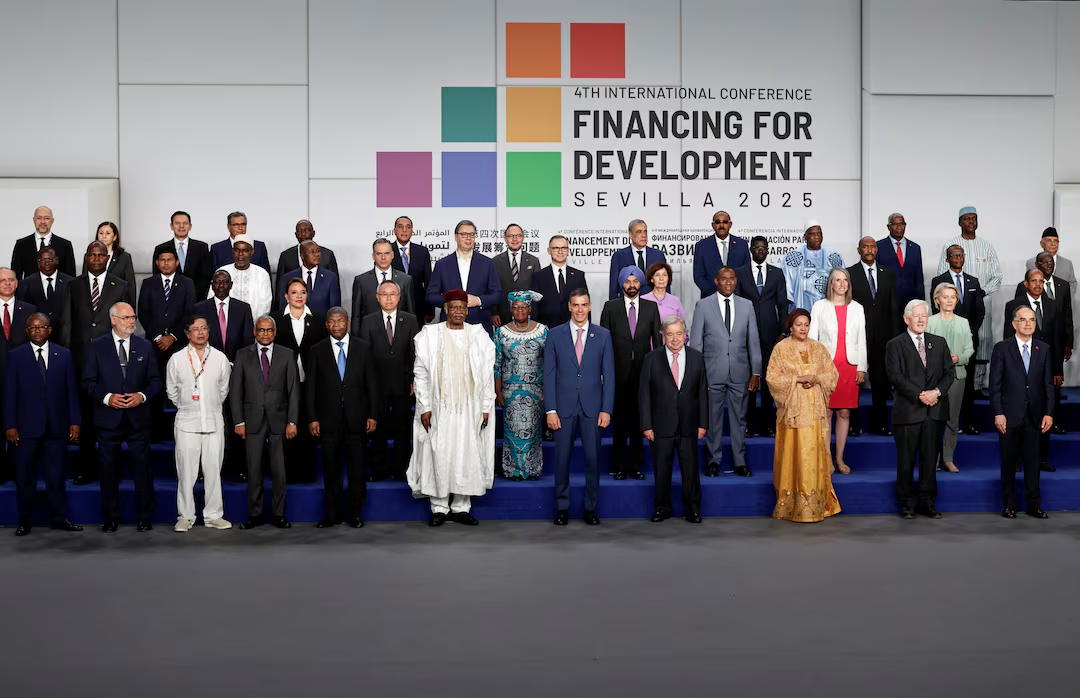A significant summit in Seville, Spain, convened over 50 global leaders to address escalating challenges in poverty reduction, climate change mitigation, and the achievement of the Sustainable Development Goals (SDGs) by 2030. U.N. Secretary-General António Guterres emphasized the urgent need to revitalize international cooperation amid waning multilateral trust. The summit introduced the “Sevilla Commitment,” a strategy aimed at enhancing global development support, particularly as wealthier nations reduce aid contributions. With two-thirds of the SDGs off track, Guterres called for over $4 trillion annually to meet targets, highlighting the necessity to reform global financial systems. Key proposals included improving tax revenue mechanisms, overhauling development banks to boost lending and attract private investment, and restructuring the credit rating system to assist developing nations. Notably, U.S. President Donald Trump was absent from the summit following the U.S.’s withdrawal from a previously negotiated plan of action. The gathering underscored the necessity for fairer borrowing frameworks, improved debt transparency, and cost-reducing debt swaps to prevent future debt crises.
The summit’s discussions were further intensified by recent environmental crises. An early summer heatwave affected much of Europe, with temperatures soaring 5-10°C above seasonal norms, prompting widespread health alerts across France, Spain, Italy, Portugal, Germany, and even the Netherlands. In Turkey, wildfires fueled by high temperatures and strong winds ravaged the western province of Izmir for a second day, forcing more than 50,000 people to evacuate, predominantly from Izmir. Similar wildfires in France’s southwestern Aude department burned 400 hectares and caused evacuations, though the fires are now under control. Spain experienced record June temperatures, peaking at 43.7°C in El Granado, while Italy issued red heatwave alerts for major cities like Rome and Milan, and planned restrictions on outdoor work. Germany also saw high temperatures, strained water supplies, and disruptions to Rhine River shipping. The extreme heat increased demand for power and raised health concerns, especially for vulnerable populations. Scientists attributed the intensifying weather events to human-induced climate change, as greenhouse gas emissions continue to rise.
The summit’s urgency was further underscored by the growing threat of climate change as a catalyst for the next global financial crisis. Unlike the 2008 crisis, which was triggered by subprime mortgage failures and financial mismanagement, current fears center on the physical risks of climate-induced disasters disrupting the real estate and insurance markets. With rising incidents of wildfires, floods, and storms, insurers are increasingly withdrawing from high-risk areas, making property insurance scarce and expensive. This could lead to plummeting property values, mortgage defaults, and economic contagion as banks abandon uninsurable regions. Although some experts and policymakers downplay the likelihood of a systemic financial collapse, many analysts warn of slow-burning financial instability caused by permanent changes to asset values due to climate risks.
Additionally, wildfire smoke emerged as a major public health crisis in the U.S., with long-term health consequences that scientists are only beginning to understand. A 2017 wildfire in Seeley Lake, Montana, revealed delayed but significant declines in lung function among residents, with effects persisting for years. Studies indicated that repeated and prolonged exposure to wildfire smoke—now more common due to climate change—can impair respiratory, immune, and even reproductive health. Research on wild animals and humans has shown reduced lung capacity, weakened immune responses, decreased sperm quality, and potential epigenetic changes. Smoke exposure also correlates with increased risks of heart disease, dementia, and premature death, with over 50,000 premature deaths linked to smoke in California between 2008 and 2018. The chemical composition of smoke varies by fire, making it difficult to study, yet the toxicity of aging smoke and materials burned significantly affects outcomes. With climate change increasing the frequency and intensity of wildfires, scientists stressed the urgency for more comprehensive, long-term studies to track the cumulative effects of smoke exposure. Without this research, the healthcare system may face growing gaps in understanding and treating chronic conditions linked to smoke pollution.
As Brazil prepares to lead the COP30 climate summit, tensions are mounting over the global commitment to limit warming to 1.5°C above pre-industrial levels, a goal set by the Paris Agreement. André Aranha Corrêa do Lago, Brazil’s COP30 president-designate, highlighted the growing concern that this target may no longer be attainable, as recent science suggests it has already been surpassed. Fewer than 30 countries have submitted updated national plans (NDCs), with critical emitters like the EU, China, and the U.S.—under Trump—lagging or disengaging entirely. Resistance from major oil-producing nations, notably Saudi Arabia, adds to the challenge, with island nations decrying what they term an “attack on science.” Despite geopolitical hurdles, including rising global tensions and budgetary conflicts, there was a modest win: China agreed to increase its contribution to the UN climate budget, supporting a proposed 10% increase. At London Climate Action Week, over 700 events emphasized technological solutions such as AI and energy storage, while business leaders, including Standard Chartered’s CEO, urged governments to bolster climate action despite geopolitical setbacks. The summit now faces the test of maintaining scientific integrity and unity in the face of growing divergences.
The United Nations development financing summit in Seville, Spain, aimed at addressing global poverty, disease, and climate change, faced challenges due to the boycott by the United States, traditionally a major donor. The conference sought to close a $4 trillion annual funding gap hindering progress on the UN Sustainable Development Goals. Despite ambitious measures such as tripling multilateral lending, enhancing tax revenues, and reallocating IMF Special Draw Rights, critics argued the “Seville Commitment” lacked the boldness needed. The U.S. withdrawal, citing disagreements over issues like development bank lending and gender terminology, was labeled “regrettable” by UN officials. Aid from wealthy countries is declining, with the U.S. having recently cut over 80% of USAID programs, and the OECD forecasting significant drops in official development assistance through 2025. These trends threaten health and education funding in the poorest nations. The summit aimed to stabilize rather than regress development commitments, with hopes that the agreements reached would lay the groundwork for stronger action at the upcoming UN climate talks in Brazil.












Leave a comment